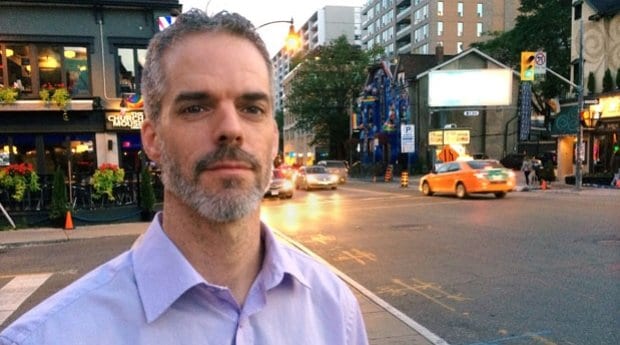Pat Roberge knows he isn’t going to win the mayoral election in October, but he still hopes his campaign will have an impact on the city.
While most media outlets have focused their coverage on three perceived front-runners — Chow, Tory and Ford — there will be 65 names on the ballot in this election. Of those 65, Roberge is the only openly gay candidate.
“I want to share my ideas,” he says. “I know that I can’t beat Tory or Chow, but if I can bring some new ideas, the new mayor might like it, and it won’t be for nothing.”
Roberge, who moved to Toronto from Sherbrooke, Quebec, in 2008 and makes a living detailing cars and running a housecleaning business, is a late addition to the mayoral campaign. He had been running for the Ward 27 council seat when he changed his mind and refiled for mayor in the final week of the nomination period. He attributes his change of mind to the fact that the incumbent in Ward 27, Kristyn Wong-Tam, is also gay.
“She’s an openly gay person, so maybe I should run as an openly gay candidate for mayor, so people can see that people are very open, they don’t discriminate,” he says.
Roberge’s platform includes a plan to raise money for transit by stepping up enforcement and collection of traffic fines, as well as imposing a sort of transaction tax of $0.05 on all sales in the city. While the idea probably wouldn’t stand up to mathematical scrutiny, Roberge says it’s time the city discusses ways to pay for necessary infrastructure.
“It seems like [the other candidates] are all saying we’re gonna have all the money from federal and provincial governments. Come on. I’m not fooled by that. You have to find the money yourself,” he says.
He also talks about recruiting more volunteers and students to supplement and reduce costs of city services and policing and stepping up policing around the Seaton House shelter on George Street, where he says drug dealing is rampant. “The taxpayers who live around there, they contribute to city hall and deserve to live in a peaceful place.”
Roberge isn’t letting his lack of political experience and deep-pocketed connections keep him from trying to make a difference.
“I think it’s still important for people to identify themselves with a role model who’s closer to the average Torontonian. That someone who’s unknown and running with almost no money can make his point and path in politics,” he says.


 Why you can trust Xtra
Why you can trust Xtra


